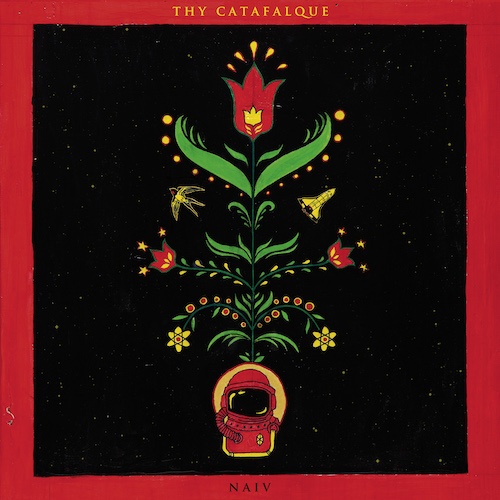
(Our old friend Professor D. Grover the XIIIth returns to NCS with this review of the new album by one of our favorite bands, Thy Catafalque, which will be released by Season of Mist on January 24th.)
Greetings and salutations, friends. I am here today because we have been blessed once again with a new Thy Catafalque album, a wonderfully common occurrence in the last few years (with new albums being released every year-and-a-half to two years). For those unfamiliar with my love affair with the work of Tamás Kátai, I first discovered Thy Catafalque in the olden days of The Number Of The Blog thanks to an old contributor, Tr00 Nate (if you’re out there somewhere, yes, I’m still giving you the credit you deserve). The album Róka Hasa Rádió was an eye-opener for me, providing a portal through which I could immerse myself in something utterly distinctive and unlike anything I had ever heard.
Since then, Thy Catafalque’s catalog has reached nine full-length albums (plus the Cor Cordium demo), and each album is a masterwork in varied songcraft. I lack any real grasp of music theory, and so I’d imagine that there is someone out there more learned than I who could probably explain it, but there is something about Kátai’s music that makes it immediately recognizable as his work, regardless of the song’s composition. Given how much variety there is in your average Thy Catafalque song, much less an entire album, this musical identity is simply staggering to me.

Naiv is a perfect example of this. It is, musically speaking, fairly consistent with the direction Thy Catafalque’s music has taken on the preceding three albums (for those keeping score at home, that would be Sgùrr, Meta, and Geometria), but at the same time it has its own wrinkles and distinct identity. To fully describe the Thy Catafalque sound would take a very, very long time to do, but Naiv in particular vacillates between heavier and quieter moments that will be familiar to fans, utilizing folky elements (see the flute in “Embersólyom” and “Kék Madár (Négy Kép)” as well as the cello, violin, and viola in “Számtalan Színek”), straightforward rock moments akin to those found on Kátai’s Neolunar side project, balls-out black metal heaviness (toward the end of the aforementioned “Embersólyom”, on “A Valóság Kazamatái”, and also as the album’s closer “Szélvész” builds to its climax), keyboard-driven atmosphere, and a few twists (“Tsitsushka” features a horn section and some funk bass).
Kátai is, as has been the case since Rengeteg, the sole band member, but he also enlists a number of guest contributors, as he has done on most of the preceding Thy Catafalque albums. There are regular contributors, such as Martina Veronika Horváth on female clean vocals (who also contributed to a number of tracks on Geometria), Perihelion singer Gyula Vasvári on male clean vocals, and former Gire bandmate Balázs Hermann, here contributing a fretless bass solo on “Tsitsushka” under the name Badó Réti. There are also first-time contributors, like Gutted guitarist/vocalist Gábor Drótos providing cello, violin, viola, and acoustic guitar on “Számtalan Színek”, and Sear Bliss trombonist Zoltán Pál performing his signature instrument on “Tsitsushka”.
As a side note, this album features Thy Catafalque’s first professionally-shot music video (which you’ll find below), a beautiful clip for “Embersólyom” featuring Martina Veronika Horváth and a dude doing a traditional Peruvian scissor dance. This is a perfect point of entry for anyone unfamiliar with Thy Catafalque, as it showcases several different sides of the band’s sound. Interestingly, the song itself is a cover of a song by a Hungarian band called Kaláka (here), and although the Thy Catafalque version is musically faithful, Kátai does a superlative job of putting his own stamp on it.

Honestly, this is one of those albums that is really difficult to describe if you’re not already familiar with Thy Catafalque’s music. If you know what Thy Catafalque sounds like, then you’ve got a good idea of what this album is about and you can then listen to see how it differs from previous work. If you’ve never heard a Thy Catafalque album before, then trying to describe to you what this album sounds like would be like trying to explain calculus to a cat. I feel like this is something that comes up in a lot of my reviews, in that to truly understand the music you have to hear it for yourself, but I suspect that might be a product of the type of music that I find myself drawn to as much as anything else. Surprisingly, there are no massive, 18-minute-plus songs, with only “Veto” clocking in at just over 8 minutes, and as a result the album feels lean and concise, even though it’s 47 minutes long. (It’s still the shortest album in the Thy Catafalque discography, but only by 4 minutes.)
For a neat summary, this is a typical Thy Catafalque album, by which I mean that it is both familiar and unpredictable, painstakingly crafted, and absolutely beautiful. Tamás Kátai is a musician whose passion and attention to detail shine through from the moment the needle drops until the last bass note fades. This is already the best album released this year, and it’s going to take something truly special to unseat it.
PRE-ORDER:
https://shopusa.season-of-mist.com/list/naiv/
https://thycatafalqueuk.bandcamp.com/album/naiv
THY CATAFALQUE:
https://www.facebook.com/thycatafalque

Absolutely brilliant album. Like you said, there’s a clear link to this album to his last few, and yet it is entirely unique.